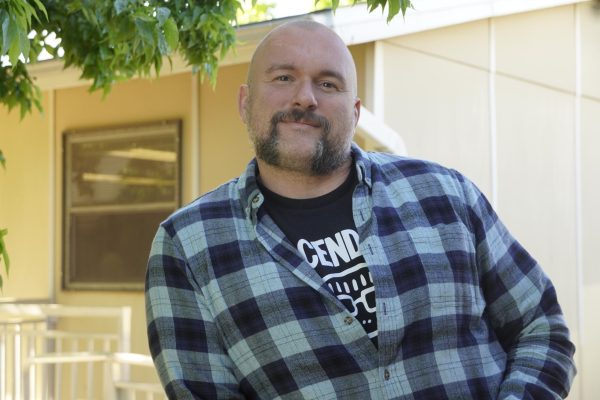Throwing pots virtually throws new challenges
Teaching ceramics and sculpture classes online presents an unfamiliar set of difficulties for Ms. West and her students.
Carey West sits in her garage studio with her dog, Lily. Since quarantine has started, Ms. West has established her workspace in her hot but functional garage. Though it’s not a perfect studio, she thinks it’s important to relate with her students on the same level. “All of this is important that I mirror the same experience that the students are having,” she said. Photo courtesy of Ms. West
For Carey West, successfully teaching her ceramics and sculpture classes virtually has taken a “herculean effort.” Not being able to walk around her studio, assisting students while they throw pots or sculpt faces out of clay has been a challenge for all people involved.
“It takes a ton more effort,” West said. “I am working incessantly to try and be prepared and have lessons ready while grading.”
Having to remake her entire curriculum from scratch, West demonstrates skills and techniques through 20-minute segments doing four or five different projects all at once.
After 14 years at McCallum, and her 18th year teaching, she thinks problem-solving things would be intuitive in the classroom, “but now,” she said, “it’s just a whole different jam.”
Though many art classes require certain kinds of papers, paints, and graphite pencils, the 3-D art department presents unique challenges because it requires sets of harder to access and costly materials. This year, the McCallum fine art teachers have come together to create the best and most inclusive artistic experience for everyone, as they put together every art supply kit by hand.
“I think one of the biggest things is that McCallum High School is one of the only high schools that offers materials and supplies to students, rather than just providing you a list and asking you to purchase them,” West said.
Besides carefully devising and building the art kits, the teachers paid for the materials out of their own pockets. They’ll be reimbursed, but it hasn’t happened yet. The teachers did this all while considering every situation and circumstance faced by their students.
“We were keeping in mind how to provide materials and keep it equitable so all students have access,” West said.
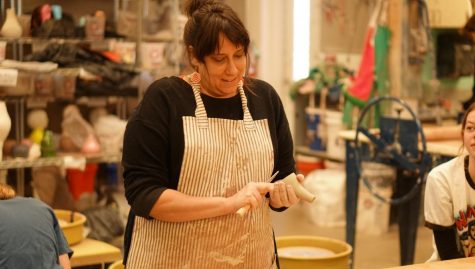
Because West suffers from Crohn’s disease, she must take medication that compromises her immunity. As a result, she has received a district accommodation, which allows her to continue to teach from home to ensure her health and safety.
But she sees another major advantage of continuing to work from home. West believes that being “in the same boat” as her students helps her relate to them and their challenges with working on projects at home.
“If I was teaching from the classroom, and they were working from their home, we wouldn’t be on the same plane,” West said. “I have already established my studio in my garage, but you know it’s hot in there. And my house doesn’t have sink traps so I have to keep an eye on clay [going down the drain].”
The constraints of home were top of mind as she put together the home studio kits.
“I think providing a small workable area was really in my thought process,” West said, “so it really is a 2-foot by 2-foot square board where all of the ceramics world will happen for my students.”
Jamie Winter, currently a junior and a Sculpture III student, thinks that Ms. West has worked extensively to provide a plan that helps students and makes projects accessible.
“I really appreciate her growing and adapting for her students,” he said. “Going online last year was really hard for everyone, but that class especially was a struggle. She works so hard to help us, and it really means a lot.”
West has discovered that working from home comes with a few upsides and a lot of challenges. While the commute can’t be beaten, there are many more interruptions.
“My dog is here and she’s very demanding, and at first I had a foster daughter and that was distracting.”
To keep working in these conditions, she has figured out routines that keep “some part of sanity happening for me.”
This includes taking her coffee outside for a break or pacing around her house as a new part of her thinking process. Online learning “has transformed my home for sure,” West said.
Like many teachers today, West misses interacting with her students most of all. She feels like she’s going insane talking to herself in video tutorials and in zoom calls, only to have no response in return.
“I wish I could have some students talk back to me,” West said.
She believes that providing opportunities to students to do their work online and pulling it off successfully, takes an enormous amount of effort.
“We’re not trying to overwhelm students, but we’re trying to provide a good experience that is supportive and thorough and thoughtful,” West said.
She stresses the point that teachers right now need student’s feedback more than ever.
“We’re willing to take your feedback, so please provide it in a positive way because this is all new ground,” West said. “Please extend your teachers some grace to make some mistakes and we’ll extend the same to you. Email us, tell us when you’re struggling. We don’t know, we’re not interacting with you. We’re separated by this divide and we need thoughtful and considerate input on how to adjust what we’re doing.”
Despite everything, West is trying her best to stay positive.
“I think the positive is that we are learning skills that we never even thought would be a part of our educational experience, especially for ceramics,” West said. “There are so many things that I’m doing that I never thought were part of this job, and I’ve got a lot of new skills. It’s kind of cool.”
Your donation will support the student journalists of McCallum High School. Your contribution will allow us to purchase equipment and cover our annual website hosting costs.


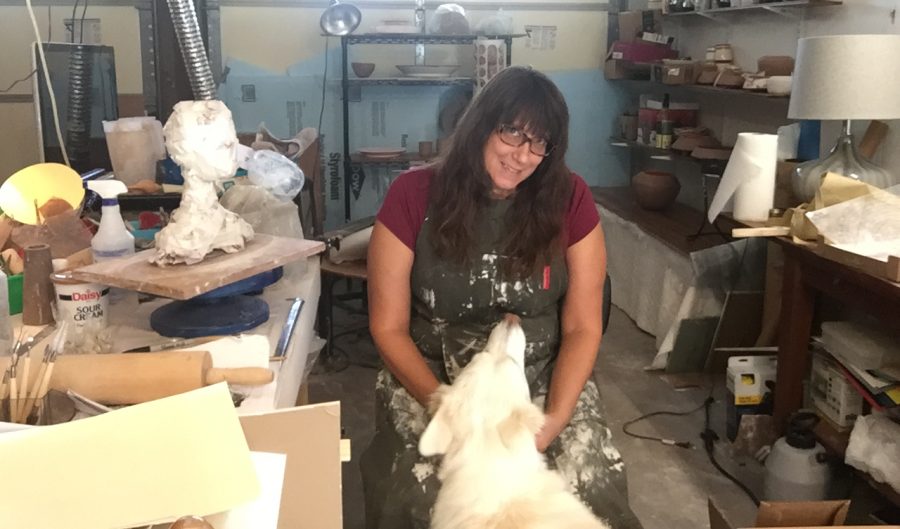
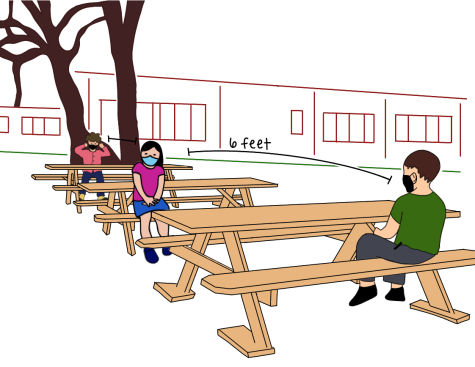
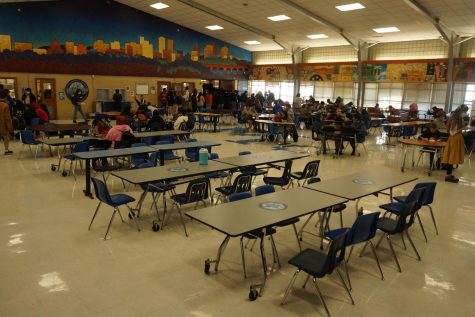
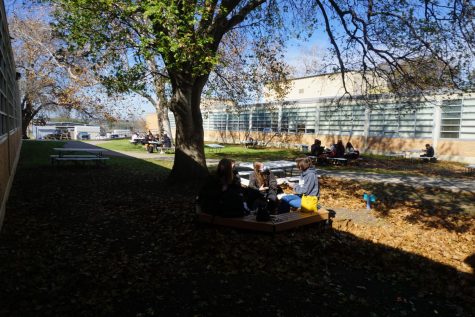
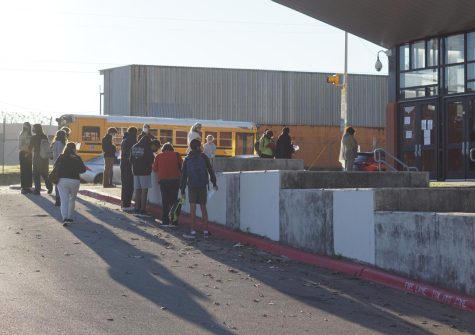

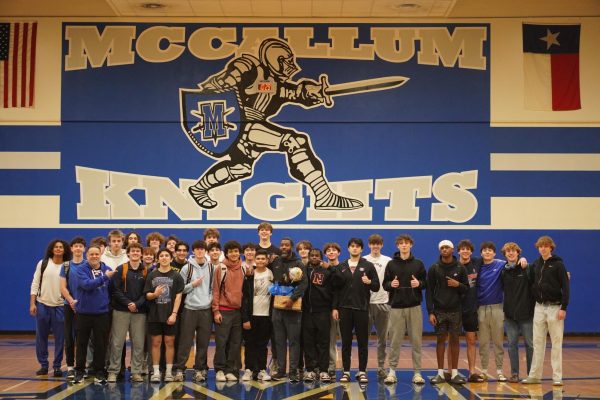
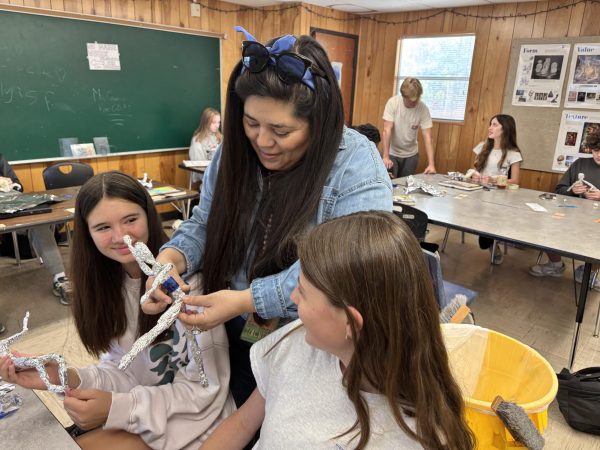

![This is Paul Pew's high school graduation photo. The 2023-2024 school year marked his 34th year of teaching. He began his career in Washington, then came to McCallum where he has taught for the past 17. At heart though, he’s really a musician. One that grew up in many different places, including Chicago and California, who took interest in teaching from a young age. His high school choir experience, along with some international singing in college, persuaded him that teaching was his path. He knew he wanted to be able to help create works of art in the fine arts department as well, so he joined McCallum. He’s worked on many of the musicals over the years, even before Joshua Denning, the former theatre director of the fine arts program arrived. Before him was a different director: Tatum.
“I was the music director for all the musicals,” Pew said. “[Mr. Tatum and I] worked very hard, and I just got to the point where I was satisfied with it.” Although he may not be as prominent of a member in the musical theatre community at McCallum anymore, he still plays piano. “I still do a lot of music down at the Music end of the building,” Pew said. Photo courtesy of Paul Pew.](https://macshieldonline.com/wp-content/uploads/2024/07/Paul-Pew-1974-444x600.jpg)
